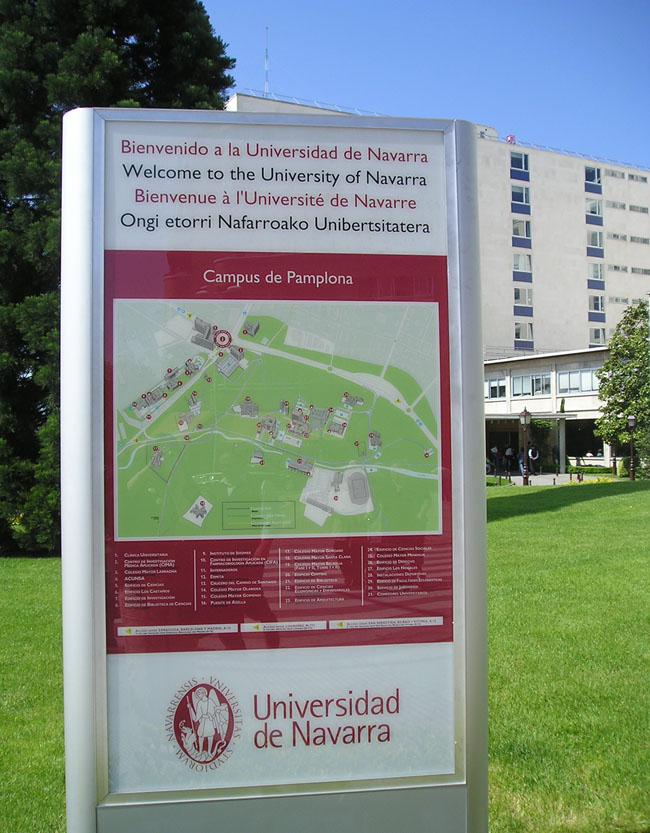 Continuing the report from Las VI Jornadas CRAI (held at teh University of Navarra in Pamplona), also yesterday I gave my own talk: What does Information Literacy mean? Some examples from different disciplines. It is embedded below from Slideshare. Before giving it, I inserted an advertisement for the Information Commons at the University of Sheffield, since people had talked about some other innovative British libraries the previous day. I said I’d put the links on my blog, so here they are: The Information commons web page at http://www.shef.ac.uk/infocommons/ ; the CILASS learning spaces webpages at http://www.shef.ac.uk/cilass/learning-spaces ; the video about CILASS learning spaces at http://www.jisc.ac.uk/media/avfiles/
Continuing the report from Las VI Jornadas CRAI (held at teh University of Navarra in Pamplona), also yesterday I gave my own talk: What does Information Literacy mean? Some examples from different disciplines. It is embedded below from Slideshare. Before giving it, I inserted an advertisement for the Information Commons at the University of Sheffield, since people had talked about some other innovative British libraries the previous day. I said I’d put the links on my blog, so here they are: The Information commons web page at http://www.shef.ac.uk/infocommons/ ; the CILASS learning spaces webpages at http://www.shef.ac.uk/cilass/learning-spaces ; the video about CILASS learning spaces at http://www.jisc.ac.uk/media/avfiles/programmes/elearning_innovation/cilass_qt.mov : the Youtube student video at http://uk.youtube.com/watch?v=D08XykTvOIo : and I also mentioned Facebook groups, such as 101 things to do in the I.C. before you graduate.
To go back to my talk: I was including elements from previous talks (how obvious this becomes when you upload them to Slideshare ;-) However, I think that some lines of argument might emerge more clearly and I will elaborate below.
At the start I was talking about how the question of “what is information literacy” can be answered in different ways. One can use definitions (I included the definition Bill Johnston and I developed). Our definition does take account of the “socio-political” element, and Bill and I have argued that information literacy is a discpline. One can look at Information Literacy in a pragmatic sort of way, using models and frameworks developed, mainly by librarians, with the aim of outlining areas of skill and knowledge that students ought to develop. I used the SCONUL 7 Pillars model as an example. You can also position information literacy as one amongst many desired attributes for a graduate (I quoted the relevant section from my own university’s learning, teaching and assessment strategy).
Another perspective is that of the individual within their own area of expertise: how they experience and conceive of informatio n literacy. This led me into a summary of some of the discoveries from our research into UK academics’ conceptions of, and pedagogy for, information literacy. I talked about the different meanings of “information” in different disciplines, outlined the conceptions of information literacy discovered in the four disciplinary areas, and talked about the implications for motivating and working with academics.
Something which I realised I had not emphasised enough in the slides was the impact of an academic's approach to teaching. From the outcomes of the research that was investigating academics’ approach to teaching information literacy, and from my own experience/observation, I would say that if you want to change the way an academic teaches information literacy than what you most want to change is their approach to teaching (rather than – their skills in information literacy). That is, this would have the most impact, if you want to have impact on student learning.
An academic might learn to search a database better, but this might not translate to any improvement in his/her students’ information literacy if the way the lecturer is teaching is still through lectures and exams. However, if the lecturer, through persuasive discussion with a librarian, is enthused to introduce a more constructivist approach to teaching, the students’ information literacy has more chance of developing. Our hope is that our research helps to reveal some ways in which people may be thinking about information literacy in their discipline, opening up more lines of communication and stimulating ideas.
2 comments:
I find this really interesting because this is exactly my experience. Librarians can get obsessed with ensuring their databases are used by students (and staff). When the curriculum is delivered, as it is beginning to be here at University of Bedfordshire Business School, in a constructivist way, we have a better chance of really developing Information Literate students (and staff). Taking this further,
Jane Secker wrote in her recent reflections on the Networked Learning Conference,
"Overall I took away from this conference a real sense of needing to concentrate on how I teach rather than how I can use technology to teach."
My oh my oh my "101 Things to do in the IC before you graduate?" That sounded like an interesting marketing approach, so I went to see.
Ah, that it was a "Just for Fun, Totally Random" page I began to twig this might be something different! Then the list: what a strange set of objectives - ah, youth!
Post a Comment